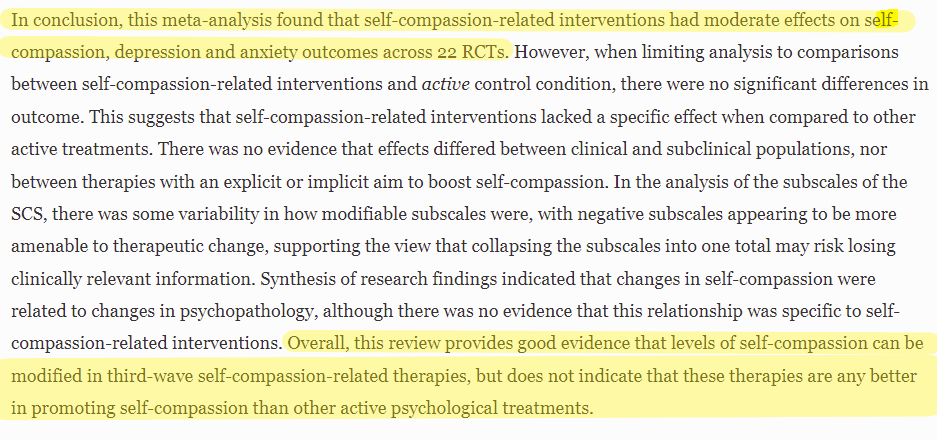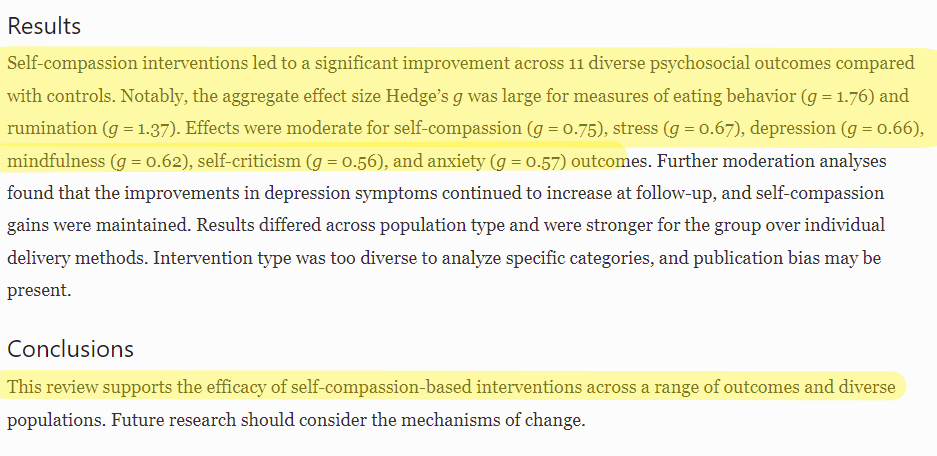What is Mindful Self-Compassion? by Elaine Mead for Positive Psychology
The Transformative Effects of Mindful Self-Compassion by Kristin Neff and Christopher Germer for Mindful
Self Compassion with Kristin Neff from The One You Feed (Podcast)
A Collection of Readings from Psychology Today-
-
A Quick Guide to Self-Compassion by Tonya Lester
-
Radical Self-Compassion by Tara Brach
-
Research Finds Self-Compassion Can Relieve Depression by Marlynn Wel
-
What Makes Self-Compassion Such a Hard Sell? by Bernard Golden
-
Is Self-Compassion Required for Human Survival? by Grant Hillary Brenner
-
Self-Compassion Counterbalances Maladaptive Perfectionism by Christopher Bergland
-
Do’s and Don’ts of Self-Compassion by Steven Stosney
-
20 Uses for Self-Compassion by Alice Boyes
-
How To Learn Self-Compassion at Home by Grant Hillary Brenner
-
6 Science-Based Self-Compassion Exercises by Tchiki Davis
A Collection of Readings from Psychology Today-
-
A Quick Guide to Self-Compassion by Tonya Lester
-
Radical Self-Compassion by Tara Brach
-
Research Finds Self-Compassion Can Relieve Depression by Marlynn Wel
-
What Makes Self-Compassion Such a Hard Sell? by Bernard Golden
-
Is Self-Compassion Required for Human Survival? by Grant Hillary Brenner
-
Self-Compassion Counterbalances Maladaptive Perfectionism by Christopher Bergland
-
Do’s and Don’ts of Self-Compassion by Steven Stosney
-
20 Uses for Self-Compassion by Alice Boyes
-
How To Learn Self-Compassion at Home by Grant Hillary Brenner
-
6 Science-Based Self-Compassion Exercises by Tchiki Davis
Eager to cultivate Mindful Self-Compassion for yourself? Start with this exercise–
Self-Compassion Break
Think of a situation in your life that is difficult, that is causing you stress. Call the situation to mind, and see if you can actually feel the stress and emotional discomfort in your body.
Now, say to yourself:
1. This is a moment of suffering
That’s mindfulness. Other options include:
-
This hurts.
-
Ouch.
-
This is stress.
2. Suffering is a part of life
That’s common humanity. Other options include:
-
Other people feel this way.
-
I’m not alone.
-
We all struggle in our lives.
Now, put your hands over your heart, feel the warmth of your hands and the gentle touch of your hands on your chest. Or adopt the soothing touch you discovered felt right for you.
Say to yourself:
3. May I be kind to myself
You can also ask yourself, “What do I need to hear right now to express kindness to myself?” Is there a phrase that speaks to you in your particular situation, such as:
-
May I give myself the compassion that I need
-
May I learn to accept myself as I am
-
May I forgive myself
-
May I be strong.
-
May I be patient
This practice can be used any time of day or night, and will help you remember to evoke the three aspects of self-compassion when you need it most.
Try practicing alone or with one of these recordings:
Further reading on self-compassion-
-
Kristin Neff
-
Christopher Germer
-
Paul Gilbert
-
Tara Brach
Wilson, A.C., Mackintosh, K., Power, K. et al. Effectiveness of Self-Compassion Related Therapies: a Systematic Review and Meta-analysis. Mindfulness 10, 979–995 (2019).

Ferrari, M., Hunt, C., Harrysunker, A. et al. Self-Compassion Interventions and Psychosocial Outcomes: a Meta-Analysis of RCTs. Mindfulness 10, 1455–1473 (2019).
Discover Kristin Neff’s detailed collection of research on these practices, guided exercises, meditations and more at https://self-compassion.org/.





